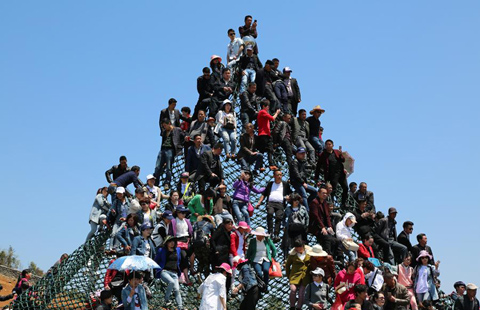Economic woes an opportunity: Brazil
Updated: 2015-06-29 05:50
By YANG ZIMAN in Beijing(China Daily Latin America)
|
||||||||
Carrying out one of the most ambitious infrastructure investment plans Latin America has ever seen, the Brazilian government wants its anxious Chinese business partners to reconsider whether the nation's current economic stagnation is a crisis to be feared or an opportunity to seize.
On June 19, President Dilma Rousseff announced the launch of the second stage of the Program of Investments in Logistics (PIL2), which will inject a total of $64 billion from 2015 to 2018, for governmental infrastructure projects to revive the country's ailing economy.
PIL2 is the follow up of PIL proposed in October 2014, a $58.9 billion public-private collaboration logistic infrastructure program. The new investment plan encompasses $27.9 billion for railroad construction, $21.3 billion for 7,000 kilometers of highway, $12.1 billion for ports, and $2.7 billion for four new airports.
Many of PIL2's railway sections, whose cost is estimated to be at least $10 billion, were contracted out to Chinese corporations.
PIL2 is launched against the backdrop of Brazil's economic stagnation. The country's GDP growth, after undergoing more than 25 years of rapid increase and hitting a high of 7.5 percent in 2010, slowed to just 0.1 percent last year. The government has forecast the growth rate to be no more than 1.2 percent in 2015. Even stimulus from hosting the FIFA World Cup in 2014 and the Olympic Games next year in Rio de Janeiro fails to salvage its sagging economy.
According to Brazil-China Business Council, with almost $80 billion of trade volume between Beijing and Brasilia by the end of 2014, China has become Brazil's largest commercial partner and consequently one of the biggest victims amidst Brazil's economic decline.
During a seminar held by Institute of Latin American Studies at the Chinese Academy of Social Sciences, Li Zhaojing, the regional manager of Hongye Holding Group Corporation Ltd, dropped a candid comment: "Brazil's economy is awful."
Li explained that the Chinese company has experienced great difficulties exporting chemical materials to Brazil in the face of the nation's current recession.
Since last year, Brazilian real has rapidly spiraled. Brazilian clients of Li's company started to demand extended terms of payment from 60-90 days to 120 days in order to transfer financial risks to Chinese companies.
Moreover, many of his long-term clients began to default on their loans. "It is not that they are dishonest, but that they are financially incapable of paying us back due to Brazil's economic decline," he said.
However, Yue Yunxia, a researcher at Institute of Latin American Studies, reminded Chinese corporations to also look at Brazil's economic downturns in a positive light, arguing that China's strong presence in PIL2 could help Chinese corporations move into wider spheres of investment.
"This might be a good change for Chinese companies to keep their economic relationship with Brazil on an even keel and further diversifies cooperation areas," she said.
China is a major importer of Brazil's bulk commodities, including iron ore and soybean, all of which requires cost-effective, safe, and timely transportation.
The rail lines that China is about to invest in, when completed, will connect Brazil's Atlantic Coast to Peru's Pacific coast, shortening transportation time between Latin America's major ports and significantly improving the whole trade efficiency level.
President Rousseff expressed similar insight. She said during an interview with People's Daily that given Brazil's current problems, there will be much more opportunities for China and Brazil to deepen cooperation in the fields of energy and technology. The construction of the transcontinental railway is one prominent example.
"Brazil and China are in the same stage of economic development and are both implementing reforms and adjustments," she said. "Now that China wishes to expand domestic demand while Brazil needs increased investment, the two countries should complement each other with their own advantages."
Nevertheless, as "Made in China" is becoming the dominant force in the Brazilian market in various areas including machines, automobiles, communication, transportation, and finance, it is more important than ever for Chinese companies to pay attention to practical problems when interacting with Brazilians.
Cheng Yilun contributed to this story.
yangziman@chinadaily.com.cn
- Japan's Diet gets 1.65m signatures against security bills
- Thailand's first MERS case declared free of deadly virus
- US, New Zealand to discuss Pacific co-op
- Beijing and Brussels unlikely to reach consensus on investment synergy
- Hollande, Essebsi vow 'solidarity against terrorism' after attacks
- French beheading suspect was 'normal neighbour'
Most Viewed
Editor's Picks

|

|

|

|

|

|
Today's Top News
European visit to find economic synergies
Disney bans selfie sticks at theme parks over safety concerns
China gets 30% stake in AIIB as bank takes shape
New York prison break ends with shooting of 2nd fugitive
Nation can meet growth challenges, premier says
China mulling 'green finance' to tackle environmental blues
Top leadership studies anticorruption ahead of CPC anniversary
Key events in the history of US gay rights
US Weekly

|

|














